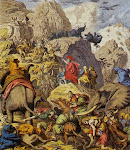Monday, February 22, 2010
Sunday, January 31, 2010
Hannibal Barca the Father of Strategy Part 3
Hannibal was one of the sons of Hamilcar Barca, a Carthaginian leader. He had several sisters and two brothers, Hasdrubal and Mago. His brothers-in-law wereHasdrubal the Fair and the Numidian king Naravas. He was still a child when his sisters married and his brothers-in-law were close associates during his father's struggles in the Mercenary War and the Punic conquest of Iberia. In light of Hamilcar Barca's cognomen, historians refer to Hamilcar's family as the Barcids. However, there is debate as to whether the cognomen Barca (meaning "thunderbolt") was applied to Hamilcar alone or was hereditary within his family. If the latter, then Hannibal and his brothers also bore the name 'Barca'.[14]
After Carthage's defeat in the First Punic War, Hamilcar set out to improve his family's and Carthage's fortunes. With that in mind and supported by Gades, Hamilcar began the subjugation of the tribes of the Iberian Peninsula. Carthage at the time was in such a poor state that its navy was unable to transport his army to Iberia(Hispania); instead, Hamilcar had to march it towards the Pillars of Hercules and transport it across the Strait of Gibraltar (present-day Morocco/Spain).[citation needed]
According to Livy, Hannibal much later said that when he came upon his father and begged to go with him, Hamilcar agreed and demanded him to swear that as long as he lived he would never be a friend of Rome. There is even an account of him at a very young age begging his father to take him to an overseas war. In the story, Hannibal's father took him up and brought him to a sacrificial chamber. Hamilcar held Hannibal over the fire roaring in the chamber and made him swear that he would never be a friend of Rome. Other sources report that Hannibal told his father, "I swear so soon as age will permit...I will use fire and steel to arrest the destiny of Rome."
Friday, January 29, 2010
Hannibal Barca the Father of Strategy Part 2
After the war Hannibal successfully ran for the office of suffete. He enacted political and financial reforms to enable the payment of the war indemnity imposed by Rome. However, Hannibal's reforms were unpopular with members of the Carthaginian aristocracy and Rome, and he fled into voluntary exile. During his exile, he lived at the Seleucid court, where he acted as military advisor to Antiochus III in his war against Rome. After Antiochus met defeat and was forced to accept Rome's terms, Hannibal fled again, making a stop inArmenia. His flight ended in the court of Bithynia, where he achieved an outstanding naval victory against a fleet from Pergamum. He was afterwards betrayed to the Romans.
Often regarded as the greatest military tactician and strategist in history, Hannibal would later be considered as one of the greatest generals of antiquity, together with Alexander the Great, Julius Caesar, Scipio, andPyrrhus of Epirus. Plutarch gives that, when questioned by Scipio as to who was the greatest general, Hannibal is said to have replied either Alexander, Pyrrhus, then himself,[11] or, according to another version of the event, Pyrrhus, Scipio, then himself.[12] Military historian Theodore Ayrault Dodge once famously called Hannibal the "father of strategy",[13] because his greatest enemy, Rome, came to adopt elements of his military tactics in its own strategic arsenal. This praise has earned him a strong reputation in the modern world and he was regarded as a "gifted strategist" by men like Napoleon Bonaparte and the Duke of Wellington. His life has been the basis for a number of films and documentaries.
He has been attributed with the famous quotation, "We will either find a way, or make one
Thursday, January 28, 2010
Hannibal Barca the Father of Strategy Part 1
Hannibal, son of Hamilcar Barca,[n 1] (248–183 or 182 BC[n 2]), commonly known as Hannibal (in Punic:Annobal,[dubious – discuss] meaning "Ba'al's grace/help/blessing", Greek: Ἁννίβας, Hanníbas)[7][8][9][10], was aCarthaginian military commander and tactician who is popularly credited as one of the most talented commanders in history. His father Hamilcar Barca was the leading Carthaginian commander during the First Punic War, his younger brothers were Mago and Hasdrubal, and he was brother-in-law to Hasdrubal the Fair.
Hannibal lived during a period of tension in the Mediterranean, when Rome (then the Roman Republic) established its supremacy over other great powers such as Carthage, and the Hellenistic kingdoms ofMacedon, Syracuse, and the Seleucid empire. One of his most famous achievements was at the outbreak of the Second Punic War, when he marched an army, which included war elephants, from Iberia over thePyrenees and the Alps into northern Italy. In his first few years in Italy, he won three dramatic victories,Trebia, Trasimene, and Cannae, and won over several Roman allies. Hannibal occupied much of Italy for 15 years, however a Roman counter-invasion of North Africa forced Hannibal to return to Carthage, where he was decisively defeated by Scipio Africanus at the Battle of Zama. Scipio studied Hannibal's tactics and brilliantly devised some of his own, and finally defeated Rome's nemesis at Zama having previously driven Hasdrubal, Hannibal's brother, out of Spain.
